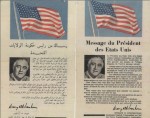In the wake of invasion and military defeat in the summer of 1940, Adolf Hitler and the French government in Vichy, now headed by Marshal Pétain, concluded an armistice by virtue of which France was divided into an occupied zone and a non-occupied zone. The conditions imposed by Germany were at first relatively lenient: the French government retained partial autonomy in the occupied north and full autonomy in the non-occupied south. Vichy also retained varying degrees of control over the French colonial empire: while Algeria remained under direct French rule, Morocco and Tunisia had the status of protectorates under their native rulers supervised by France. In Morocco, King Mohammed V defied France by refusing to apply Vichy’s antisemitic laws. In Tunisia, Gestapo and SS followed Erwin Rommel’s army and, in 1942, rounded up the Jewish population for deportation to the Nazi death camps.
In the spring of 1942, strong disagreements among the Allies came to light in regard of the strategy to adopt against Germany. While President Franklin Roosevelt initially leaned in favor of Josef Stalin’s insistent demand for a landing in Western Europe in 1942, in the end, he reluctantly rallied to Prime Minister Winston Churchill’s view that such a landing at that time could not possibly succeed. He believed that the Allies would not be ready for this risky operation until late in 1943, or even 1944. Churchill proposed that, instead, an Allied landing be staged in North Africa, in order to deny Germany and Italy full control over the Mediterranean and compel Rommel’s army, which was retreating from Libya, to fight on two fronts.
In preparation for this operation, the Americans entered into secret contacts with the anti-Vichy underground in Algiers to enlist its assistance in the landing, albeit with some reluctance since the United States still recognized the legality of the Vichy government with which it maintained diplomatic relations.
Such is the background of Operation Torch placed under the command of Gen. Dwight Eisenhower. On the morning of Nov. 8, 1942, a mostly American fleet of more than 100,000 men landed under air cover on the coasts of Morocco and Algeria. Three days later, the Germans violated the armistice of 1940 and invaded the southern zone of France in collaboration with the Italians.
In the port of Algiers, the landing was greatly facilitated by the local resistance, composed in the main of young students, who effectively sabotaged the communications of the local French military, seized public buildings and even arrested two of the top commanders: Admiral François Darlan, Pétain’s former prime minister, and Gen. Alphonse Juin. It is important to note that two-thirds of these 400 young resistance fighters were Jews. The French authorities in Algeria were fanatically devoted to Vichy and so zealous in the implementation of that regime’s antisemitic legislation, that they established internment camps in the Sahara in preparation for the round-up and deportation of the Jewish population to the death camps of Europe. Vichy also deprived the 116,000 Jews of Algeria of the French citizenship that had been awarded them in the 19th century.
What happened after the Allied landing is simply shocking. The young Jews, whose support facilitated the capture of the Algerian capital, were abandoned to whatever fate had in store for them. Instead of handing North Africa to the control of the Free French Forces organized by Gen. Charles de Gaulle from London, the Americans allowed Vichy’s stooges to remain at the helm.
What happened after the Allied landing is simply shocking. The young Jews, whose support facilitated the capture of the Algerian capital, were abandoned to whatever fate had in store for them. Instead of handing North Africa to the control of the Free French Forces organized by Gen. Charles de Gaulle from London, the Americans allowed Vichy’s stooges to remain at the helm.
Roosevelt despised de Gaulle and his Free French Forces, and chose to place in command of the French army of North Africa, whose commanders, including Darlan, resented Germany’s violation of the armistice of 1940, the semi-Vichyste Gen. Henri Giraud. The young anti-Vichy fighters were for the most arrested and interned in the Sahara. Some of them narrowly avoided being executed. The Vichy laws remained in force. De Gaulle eventually rallied a number of generals in charge of colonial troops in French Equatorial Africa and arrived in May 1943 in Algiers, where he established the authority of Free France, invalidated the Vichy laws, and restored to the Jews their French citizenship.
Unfortunately for those of us who grew up revering him, Roosevelt’s connivance with Giraud and Vichy’s military commanders, and politicians in Algeria who had conveniently changed sides, was not the only instance of his betrayal of the hope that our people had pinned on him during the dreadful years of the Shoah. As for de Gaulle, the sympathy that he expressed for the suffering of our people at the time of the liberation of France and his sadness-filled admonition to his Jewish soldiers in the Free French Forces that antisemitism was not dead, were expressions of a friendship, which unfortunately did not survive the temptations of realpolitik and opportunism. On the morrow of Israel’s victory in the Six Day War of 1967, de Gaulle labeled the Jews a “proud and domineering people” and turned France from an ally into an enemy of Israel.
It took nearly half a century for the Jewish resistance in France to win official recognition; for the members of the Jewish communist urban underground, even longer. The Jewish contribution to the liberation of French Algeria is only now beginning to be written about.
René Goldman is professor emeritus at the University of British Columbia.

